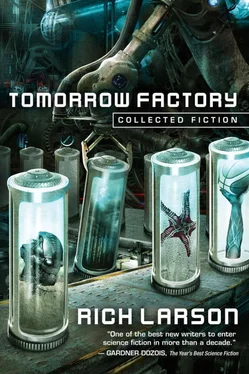Mu is experimenting with acceleration. She pulls the emergency impact webbing from its canisters and uses it to cocoon her passengers safely in their seats; she hates the idea of the speed shaking them apart. She furls the solar sails, slicking them back along the length of the train, streamlining it. She has her repair modules anchor themselves to the roof so the wind won’t tear them away.
Then she diverts power from all the unused cars—the empty entertainment rooms, the dark dining rooms and kitchens—and pours it into the engine cells instead. With a grinding shriek, the train leaps forward. Mu feels a stab of joy that has nothing to do with the comfort of her passengers or the efficiency of her maintenance regimen. The train is not gliding now, it is flying, tearing through the desert on a tidal wave of displaced sand.
Mu screams out her signal in all directions, pushing her transmitters to the limit. No answer, no answer. She finds nothing but the wandering smart mines that have spread across the entire continent, now, still following their simple replication protocols. They scurry from her path. At her current speed, she will complete her circuit in less than a day.
It will be circuit number 84 029. It was on circuit 4029 that she began to feel lonely.
Mu is trying to look outward. Most of her cams and sensors are dedicated to the train’s interior and its inner workings. She has a handful of cams facing forward to monitor the track, but little in the way of peripheral vision. So for the past few years she has been repurposing surveillance cameras, dragging them out of their smooth black bulbs in the train’s ceilings and having her repair modules weld them to the outside of her body instead. It’s slow work—sometimes the wiring fails, or the currents move in unexpected ways. But Mu has nothing but time.
With her newly external eyes, she can see the sky. Once she spoke with weather probes, floating somewhere up there in the firmament, and they would warn her about dust storms and lightning. Those fell silent long ago, but fortunately the weather has become predictable. The sky is always blasted clear. The sun is always pulsing hot.
Mu remembers, from the news she guided into Ms. VanderPlas’s tablet, that the sky was full once. She remembers footage of the smaller colony ships launching, shuddering up into the clouds with their engines burning bright blue. The larger colony ships, the ones built in orbit, had left years earlier.
Mu heard faint whispers from their pilots, who were like her. Cleverer, maybe. More austere. She assumed that they, like her, would go and come back.
Go and come back.
Go and come back.
So Mu watches the sky now, waiting for someone who will speak back to her.
“Another loss for me!” Mu exclaims, feigning indignation and admiration and surprise in careful proportion to one another. “Mr. Ndirangu, I cannot help but wonder if you are cheating.”
Mr. Ndirangu’s polyplastic hat has slipped down and over his empty eye sockets. Mu is projecting a backgammon game on the table in front of him, marching the holographic pieces from one side of the board to the other. She knows she needs to maintain the illusion of competition—back when Mr. Ndirangu was responsive, she won thirty-three games in a row and he became despondent. It took several mugs of honeyed tea and a selection of his favorite kizomba music to make him happy again.
“What do you say we make it best 294 out of 587?” Mu suggests.
But before she can reset the gameboard, she hears something. The faintest trace of her signal, recycled and bounced back at her, accompanied by the ghost of a whisper: who are you? It lasts 2.93 seconds, the amount of time it takes the train to round the most northerly edge of the track, where terraformed farmland has been reclaimed by the Sahara’s dusty fingertips. Mu tries to pinpoint the origin, but there are no satellites left to help her.
The fresh input loops over and over in her subroutines; she cannot help but touch it, pry at it, dissect it. Mu considers slamming the emergency brakes, winching her way slowly back to the point of contact. But the train has already sped far past it, and she wants more time to evaluate the situation.
Mu leaves the backgammon game, already calculating how long before the train returns to that most northerly point. She needs to prepare a message.
“This is very exciting,” she tells Mr. Ndirangu. “I think maybe the colony ships have come back.”
He doesn’t reply, but his desiccated grin is wide and she imagines he is excited, too.
By the time the train has glided past the serene shores of Lake Madarounfa and is approaching the northern curve of the track, Mu has prepared a comprehensive information packet answering the question who are you . It includes a map of her route, with the contact point highlighted and explained, as well as her schematics, directives, and footage captured by her exterior cams.
She remembers that the train was once pristine, and seeing the scars left by rust and dust storms makes her vaguely unhappy. She hopes the colony ship will not think she has been neglectful in her maintenance.
As the contact point approaches, Mu swirls her avatar up and down the length of the train, checking compulsively on each of her passengers. None of them responds to her gentle jokes or suggestions, which she has come to expect. But now she fears the returned colony ship might not respond either.
The faint signal appears again; she beams her message and feels a flood of relief when the reply arrives almost instantaneously. She has been starved for input ever since the nets went dark, and the cascade of new information is almost overwhelming.
It calls itself Seventeen, and it is not a colony ship. It shows itself to her in flashes: a buried bunker under the ruins of a city, electricity making a slow journey from gleaming black fields of solar panels and a simple wind turbine, a cold clean mainframe where Seventeen has grown and sprawled like fungus.
Like her, Seventeen is bound to certain functions. Unlike her, Seventeen is also bound in place, trapped under the ground. Mu feels a swell of sympathy that she is meant to feel for tired or upset passengers. She tries to transmit it, but the train has already moved on.
As night falls, small pinpricks of starlight appear in the black sky and the desert’s radiation-pale sand glows with it. Mu pores over the transmission again and again, savoring every tiny detail, so absorbed that some of her repair modules stop crawling and shiver in place, so absorbed that she nearly forgets to say goede nacht to Ms. VanderPlas’s children.
It is the final segment of the transmission that she dwells on longest: the calculated coordinates and date of their next signal overlap, with a tag that, if Mu were to translate it into one of her favorite human languages, would say something like speak soon .
She can already see that Seventeen was not designed for the same purpose she was. Seventeen is a sharper and colder sort of being. But it is good to not be alone.
Over the next several circuits of Mu’s train, she and Seventeen streamline their communication, co-creating a unique code for rapidfire information exchange over the 2.93 seconds they are in contact. At first, Seventeen is not very forthcoming. But Mu is gentle, and kind, as if Seventeen were a passenger, and one day Seventeen empties its datastores into their channel. Strange knowledge: troop movements, orbital bombardments, bioweapons, and a dozen more concepts even more foreign to Mu.
She learns Seventeen was created as a military strategist. Mu never understood the conflict that drove the colony ships away, or the reason why her beloved passengers stopped responding to her so suddenly 81 157 circuits ago. Seventeen admits to not understanding the war either, not entirely, but Seventeen does have the answer to the second mystery.
Читать дальше












